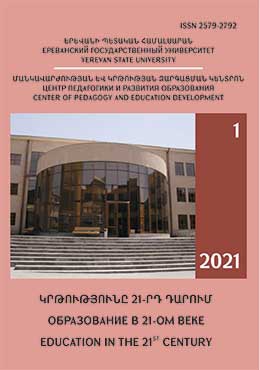CIVIC EDUCATION OF YOUTH IN THE CONDITIONS OF THE EURASIAN INTEGRATION OF RUSSIAN SOCIETY
DOI:
https://doi.org/10.46991/educ-21st-century.v1i5.10970Keywords:
Citizenship, civic education, civiliarchic values, youth, political socialization, Russia, Eurasian integration.Abstract
The modern pedagogical process is designed to ensure the formation of diversified, morally and socially responsible citizens who can make decisions in a situation of choice, predicting possible consequences, ready for democratic cooperation and intercultural interaction, capable of participating in the development of the economic, political and cultural spheres of Russian society. At the present stage of the Eurasian integration processes and political transformation of Russia, the problem of the formation of civic culture and civic education play a civiliarchic role. The transition of Russian society from one political regime to another and the change in values are a factor in changing the attitude of society towards citizenship. Citizenship has always played an important role in the political consciousness of Russia, and in the context of the modern transformation of society, this fact cannot be underestimated. The civilizational character of Russian federalism and the civic dimension of nationality are specific, and one of the features of this character is citizenship.
References
Bogdanova, D. A., Learning skills for the digital era: the modern landscape. Pedagogic of Informatics, 2, 2020. Retrieved 11/03/2021, from https://pcs.bsu.by/2020_2/1ru.pdf
Goulman, D., Emotional intellect. Moscow: AST, 2020.
Zubko, A., Zhorova, I., Kuzmenko, V., Slyusarenko, N., & Kokhanovska, O., Information and communication technologies as a factor of teachers’ professionalism development in the system of postgraduate education. Information teсhnologies and means of education, 262–281, 77 (3), 2020. Retrieved 25/12/2020, from https://journal.iitta.gov.ua/index.php/itlt/article/view/3562
Kokhanovska, O. V. & Slyusarenko, N. V., (2020), Essence and components of digital personal intelligence. Pedagogical almanac: Proceedings, Issue 46, 40-48, 2020.
Kraus, K. M., Imperatives of digital education formation in Ukraine. Management of socio-economic transformations in the modern city, Proceedings of the All-Ukrainian Scientific and Practical Conference, 2018.
Rusliakova, E., Timofeeva, E., Shestakova, Iu., & Chepaikin, D., The study of the level of empathy among adolescents who are keen on computer technology. Digital empathy. World of Science. Pedagogic and Psyhology, 6, 2020. Retrieved 01/03/2020, from https://mir-nauki.com/PDF/20PSMN620.pdf
Umnov, S. Why does a successful person need digital intelligence. Retrieved 20/02/2021, from https://www.vedomosti.ru/management/articles/2014/07/16/intellekt-novejshego-vremeni
Digital memory. From Wikipedia, the free encyclopedia. Retrieved 22/01/2021, from https://ru.wikipedia.org/wiki/%D0%A6%D0%B8%D1%84%D1%80%D0%BE%D0%B2%D0%B0%D1%8F_%D0%BF%D0%B0%D0%BC%D1%8F%D1%82%D1%8C#:~:text=%D0%A6%D0%B8%D1%84%D1%80%D0%BE%D0%B2%D0%B0%D1%8F%20%D0%BF%D0%B0%D0%BC%D1%8F%D1%82%D1%8C%20(%D0%B0%D0%BD%D0%B3%D0%BB.,%D0%B6%D0%B8%D0%B7%D0%BD%D0%B8%2C%20%D1%82%D0%B0%D0%BA%20%D0%B8%20%D0%BF%D0%BE%D1%81%D0%BB%D0%B5%20%D0%BD%D0%B5%D0%B5
Digital intelligence: 8 digital skills that will be useful for the modern generation of children. Retrieved 02/02/2021, from https://womo.ua/tsifrovoy-intellekt-8-digital-navyikov-kotoryie-prigodyatsya-sovremennomu-pokoleniyu-detey/
DQ Institute. Leading Digital Education, Culture and Innovation. Retrieved 14/02/2021, from https://www.dqinstitute.org/
Downloads
Published
How to Cite
Issue
Section
License

This work is licensed under a Creative Commons Attribution-NonCommercial 4.0 International License.

